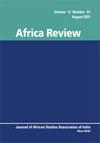阻碍民间社会组织有效参与尼日利亚采掘业透明度倡议的障碍
IF 0.5
Q4 AREA STUDIES
引用次数: 1
摘要
采掘业对尼日利亚的经济发展至关重要。因此,《2007年尼日利亚采掘业透明度倡议法》第6节规定设立一个由民间社会组织参与的名为“国家利益攸关方工作组”的利益攸关方论坛。但民间社会组织参与这一论坛的效果并不好。本文采用理论方法,分析了民间社会组织作为利益相关者代表在尼日利亚采掘业透明度倡议中的作用。它力求查明妨碍他们有效参与的障碍。本文发现,民间社会组织之间缺乏合作、总统将其任命为论坛成员政治化等问题阻碍了民间社会组织有效参与国家利益攸关方工作组。建议修改《尼日利亚采掘业透明度倡议法》第6节,使民间社会组织能够自由地任命一名代表参加论坛,同时鼓励民间社会组织在它们之间发展更好的协同作用。本文章由计算机程序翻译,如有差异,请以英文原文为准。
Obstacles to effective participation of civil society organizations in Nigerian extractive industry transparency initiative
ABSTRACT The extractive industry is essential to the economic development of Nigeria. Accordingly, section 6 of Nigerian Extractive Industry Transparency Initiative Act 2007provides for a stakeholders forum called National Stakeholders Working Group of which Civil Society Organizations are involved. But the participation of civil society organizations in this forum has not been effective. Using doctrinal approach, the paper analyses the roles of civil society organizations as stakeholder representative in Nigerian Extractive Industry Transparency Initiative. It seeks to identify the obstacles hindering their effective participation. The paper finds that problems ranging from lack of cooperation among the civil society organizations, politicization of their appointments by the President into the forum and other issues act as hindrances to their effective participation in the National Stakeholders Working Group. It is suggested that section 6 of Nigerian Extractive Industry Transparency Initiative Act be amended to give civil society organization the freedom to appoint a representative into the forum while they are encouraged to develop a better synergy amongst them.
求助全文
通过发布文献求助,成功后即可免费获取论文全文。
去求助
来源期刊

Africa Review
AREA STUDIES-
CiteScore
1.80
自引率
12.50%
发文量
22
期刊介绍:
Africa Review is an interdisciplinary academic journal of the African Studies Association of India (ASA India) and focuses on theoretical, historical, literary and developmental enquiries related to African affairs. The central aim of the journal is to promote a scholarly understanding of developments and change in Africa, publishing both original scholarship on developments in individual countries as well as comparative analyses examining the wider region. The journal serves the full spectrum of social science disciplinary communities, including anthropology, archaeology, history, law, sociology, demography, development studies, economics, education, gender studies, industrial relations, literature, politics and urban studies.
 求助内容:
求助内容: 应助结果提醒方式:
应助结果提醒方式:


